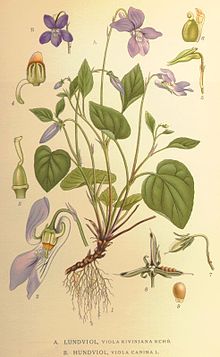- Viola riviniana
-
Viola riviniana 
Scientific classification Kingdom: Plantae (unranked): Angiosperms (unranked): Eudicots (unranked): Rosids Order: Malpighiales Family: Violaceae Genus: Viola Species: V. riviniana Binomial name Viola riviniana Viola riviniana, the Common Dog-violet, is a species of the genus Viola. It is also called wood violet or dog violet. It is a perennial herb of woodland rides, grassland and shady hedge banks. It is found in all soils except acid or very wet.
It is a perennial, which flowers from April to June.
Its leaves are heart shaped with rounded teeth and are usually hairless. It has 2 slender bracts, 6 sepals spear shaped lobed at the base, 5 overlapping petals with a backward pointing spur. Once the flower has been fertilised, the spur will split into 3 to reveal the egg shaped seeds - see Viola description.
Toothed stipules can be found at the base of the plant.
Viola riviniana was voted the County flower of Lincolnshire in 2002 following a poll by the wild plant conservation charity Plantlife.[1]
Contents
Name
The name 'Dog' - probably suggests that this plant was thought to be inferior to the scented violet (viola odorata), which was particularly favoured during the Victorian Era.
Wildlife value
It is the foodplant of the Pearl bordered fritillary, Small Pearl-bordered Fritillary, Silver-washed Fritillary and High Brown Fritillary butterfly.
Similar species
- Sweet Violet Viola odorata - sweetly scented and has all the leaves at the base of the plant, the stipules are gland tipped
- Heath Dog Violet Viola canina - has clear blue flowers, narrower leaves and smaller teeth on the stipules
- Marsh Violet Viola palustris - found in wet places, leaves are kidney shaped which come from underground creeping stems, and the flowers are dark-veined. The stipules have no teeth at all.
- Alpine Violet Viola labradorica - V. riviniana is sometimes sold by nurseries as V. labradorica.
Note that pansies are also of the Viola Genus.
Hybrids
This species hybridises with Early Dog-violet (V. reichenbachiana) to produce Viola × bavarica.
Cultural icon
Dog violets, and badges depicting them,[2][3] were sold in fund-raising efforts in the UK and Australia on and around Violet Day[4] in commemoration of the lost soldiers of World War I.
Further reading
Identification
- Partridge, James (2007) Viola × bavarica: the punctual Dog-violet BSBI News 106:8-9 (illustrated with colour photographs on inside back cover of this edition)
References
- ^ Plantlife website County Flowers page
- ^ NMA Collections Search National Museum of Australia (2003-2010) - Violet Day 1917 fundraising badge
- ^ Worthopedia WW1 1917 Violet Day Badge with image
- ^ Family History South Australia Leadbeater,B (2006). World War 1 Violet Day South Australia.
External links
 Media related to Viola riviniana at Wikimedia Commons
Media related to Viola riviniana at Wikimedia CommonsThis Violaceae article is a stub. You can help Wikipedia by expanding it.
